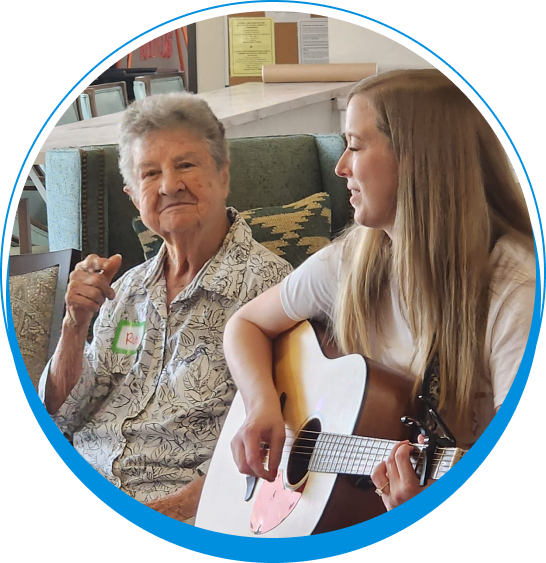People living with dementia will be more confused and disoriented in an emergency situation.
They may not be able to appropriately respond and manage emergency/changing situations like a healthy adult.
- Limit Stimulation
- Lower noise level, is there a glare from lighting or shadows on the wall, sensations (hot/cold), too many people in room can cause anxiety
- If you cannot modify the environment try headphones to minimize noise or distract with music, use sunglasses, and layer on clothing
- Be prepared to assist with all self-care activities
- Make sure they are drinking and eating. They may not remember to eat or drink
- Take them to restroom on a regular basis to avoid any potential accidents. They may not remember where the restroom is located.
- Distract and Redirect
- Go for a walk
- Ask them to help (separate cans from boxes or fold blankets)
- Communication
- Avoid long, elaborate explanations. Give only NEEDED information and give it one thought at a time
- Provide constant reassurance
- “You are safe and in the right place.”
- Watch their body language like pacing, fidgeting, anxiousness. Do not ignore these signs, intervene before they become a “problem”
- Anticipate unexpected reactions and wandering issues – do not leave them alone
- Watch YOUR body language. They will mimic what they see.
- Do not argue, confront or condescend. They are adults and expect to be treated as adults.
- Acknowledge and respond to their feelings (not necessarily their words)
- “You seem scared. I know you are, but you are in a safe place and we are together”
- Tell others about a diagnosis – volunteers and emergency response teams will be able to better assist you.
ASSISTING CONFUSED ELDERLY. People living with dementia cannot manage changing situations like a healthy adult. Confusion can lead to panic. Use the following tips:
LIMIT AGITATION FROM EXCESS NOISE, CROWDS AND DISCOMFORT. Use headphones with soft music, sunglasses, a snack, and adequate clothing/blankets.
REASSURE REGULARLY “I know you are scared. You are safe and in the right place and we are together.”
USE SIMPLE SENTENCES, SLOWLY, CALMLY. USE A PLEASANT FACE. They cannot comprehend complex information.
REDIRECT RESTLESSNESS BY GIVING THEM FOOD, WATER OR A SIMPLE JOB TO DO.
THEY MAY NOT REMEMBER TO EAT, DRINK AND USE THE TOILET. CHECK OFTEN OR ASSIGN A BUDDY.
COHORT ELDERS NEAR FOOD, WATER AND TOILETS. ASSIGN VOLUNTEERS TO STAY WITH THEM.
PROVIDE WRISTBANDS WITH NAME, FAMILY NAMES AND CONTACT INFORMATION.


